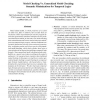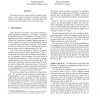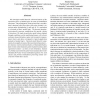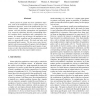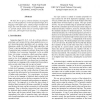109
Voted
LICS
2005
IEEE
15 years 8 months ago
2005
IEEE
Three-valued models, in which properties of a system are either true, false or unknown, have recently been advocated as a better representation for reactive program abstractions g...
130
click to vote
LICS
2005
IEEE
15 years 8 months ago
2005
IEEE
We provide a uniform solution to the problem of synthesizing a finite-state distributed system. An instance of the synthesis problem consists of a system architecture and a tempo...
97
Voted
LICS
2005
IEEE
15 years 8 months ago
2005
IEEE
We propose L-nets as a game model of concurrent interaction. L-nets, which correspond to strategies (in Games Semantics) or designs (in Ludics), are graphs rather than trees; the ...
63
Voted
LICS
2005
IEEE
15 years 8 months ago
2005
IEEE
116
Voted
LICS
2005
IEEE
15 years 8 months ago
2005
IEEE
A number of authors have exported domain-theoretic techniques from denotational semantics to the operational study of contextual equivalence and preorder. We further develop this,...
LICS
2005
IEEE
15 years 8 months ago
2005
IEEE
We construct a domain-theoretic calculus for Lipschitz and differentiable functions, which includes addition, subtraction and composition. We then develop a domaintheoretic versio...
101
click to vote
LICS
2005
IEEE
15 years 8 months ago
2005
IEEE
We investigate model theoretic characterisations of the expressive power of modal logics in terms of bisimulation invariance. The paradigmatic result of this kind is van Benthem�...
138
Voted
LICS
2005
IEEE
15 years 8 months ago
2005
IEEE
Games played on graphs may have qualitative objectives, such as the satisfaction of an ω-regular property, or quantitative objectives, such as the optimization of a realvalued re...
119
Voted
LICS
2005
IEEE
15 years 8 months ago
2005
IEEE
We show how to give a coherent semantics to programs that are well-specified in a version of separation logic for a language with higher types: idealized algol extended with heap...
129
click to vote
LICS
2005
IEEE
15 years 8 months ago
2005
IEEE
We introduce the language QML, a functional language for quantum computations on finite types. Its design is guided by its categorical semantics: QML programs are interpreted by ...
